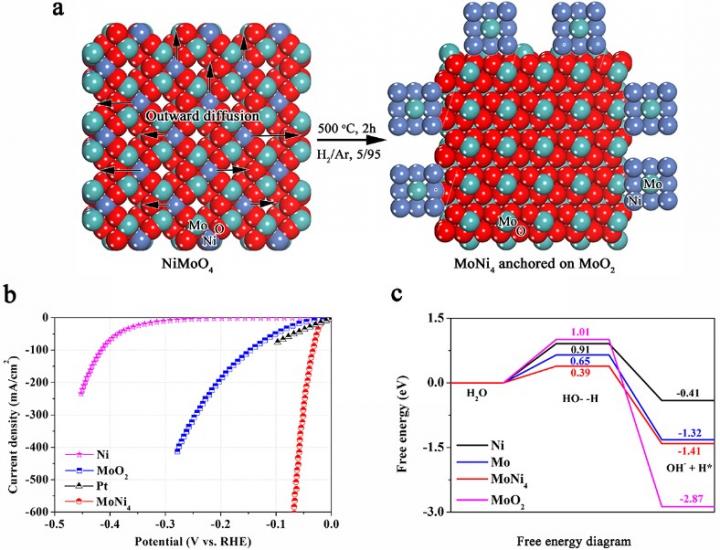New approach to revolutionize the production of molecular hydrogen

This figure shows: a) Synthetic scheme of MoNi4 electrocatalyst supported by the MoO2 cuboids on nickel foam; b) polarization curves of the MoNi4 electrocatalyst supported by the MoO2 cuboids, pure Ni nanosheets and MoO2 cuboids on the nickel foam; c) calculated adsorption free energy diagram for the Tafel step. Credit: Xinliang Feng/cfaed
Growing concern about the energy crisis and the seriousness of environmental contamination urgently demand the development of renewable energy sources as feasible alternatives to diminishing fossil fuels. Owing to its high energy density and environmentally friendly characteristics, molecular hydrogen is an attractive and promising energy carrier to meet future global energy demands. In many of the approaches for hydrogen production, the electrocatalytic hydrogen evolution reaction (HER) from water splitting is the most economical and effective route for the future hydrogen economy. To accelerate the sluggish HER kinetics, particularly in alkaline electrolytes, highly active and durable electrocatalysts are essential to lower the kinetic HER overpotential. As a benchmark HER electrocatalyst with a zero HER overpotential, the precious metal platinum (Pt) plays a dominant role in present H2-production technologies, such as water-alkali electrolysers. Unfortunately, the scarcity and high cost of Pt seriously impede its large-scale applications in electrocatalytic HERs.
Prof. Xinliang Feng's team from the Technische Universität Dresden (Germany)/ Center for Advancing Electronics Dresden (cfaed), in collaboration with the University Lyon, ENS de Lyon, Centre national de la recherche scientifique (CNRS, France), the Tohoku University (Japan) and the Fraunhofer Institute for Ceramic Technologies and Systems (IKTS) (Germany), have reported a low-cost MoNi4 electrocatalyst anchored on MoO2 cuboids, which are vertically aligned on nickel foam (MoNi4/MoO2@Ni). MoNi4 nanoparticles are constructed in situ on the MoO2 cuboids by controlling the outward diffusion of Ni atoms. The resultant MoNi4/MoO2@Ni exhibits a high HER activity that is highly comparable to that of the Pt catalyst and presents state-of-the-art HER activity amongst all reported Pt-free electrocatalysts. Experimental investigations reveal that the MoNi4 electrocatalyst behaves as the highly active centre and manifests fast Tafel step-determined HER kinetics. Furthermore, density functional theory (DFT) calculations determine that the kinetic energy barrier of the Volmer step for the MoNi4 electrocatalyst is greatly decreased. The large-scale preparation and excellent catalytic stability provide MoNi4/MoO2@Ni with a promising utilization in water-alkali electrolysers for hydrogen production. Therefore, the exploration and understanding of the MoNi4 electrocatalyst provide a promising alternative to Pt catalysts for emerging applications in energy generation.
###
This work was financially supported by the ERC Grant on 2DMATER and EC under Graphene Flagship (No. CNECT-ICT-604391).
Media Inquiries:
Prof. Xinliang Feng
Technische Universität Dresden
cfaed Chair of Molecular Functional Materials
Phone: +49 (0) 351 463-43251
E-mail: xinliang.feng@tu-dresden.de
cfaed
cfaed is a microelectronics research cluster funded by the German Excellence Initiative. It comprises 11 cooperating institutes in Saxony. About 300 scientists from more than 20 countries investigate new technologies for electronic information processing. These technologies are inspired by innovative materials such as silicon nanowires, carbon nanotubes or polymers or based on completely new concepts such as the chemical chip or circuit fabrication methods by self-assembling structures such as DNA-Origami. The orchestration of these new devices into heterogeneous information processing systems with focus on their resilience and energy-efficiency is also part of cfaed's research program which comprises nine different research paths.
Media Contact
All latest news from the category: Materials Sciences
Materials management deals with the research, development, manufacturing and processing of raw and industrial materials. Key aspects here are biological and medical issues, which play an increasingly important role in this field.
innovations-report offers in-depth articles related to the development and application of materials and the structure and properties of new materials.
Newest articles

Superradiant atoms could push the boundaries of how precisely time can be measured
Superradiant atoms can help us measure time more precisely than ever. In a new study, researchers from the University of Copenhagen present a new method for measuring the time interval,…

Ion thermoelectric conversion devices for near room temperature
The electrode sheet of the thermoelectric device consists of ionic hydrogel, which is sandwiched between the electrodes to form, and the Prussian blue on the electrode undergoes a redox reaction…

Zap Energy achieves 37-million-degree temperatures in a compact device
New publication reports record electron temperatures for a small-scale, sheared-flow-stabilized Z-pinch fusion device. In the nine decades since humans first produced fusion reactions, only a few fusion technologies have demonstrated…





















